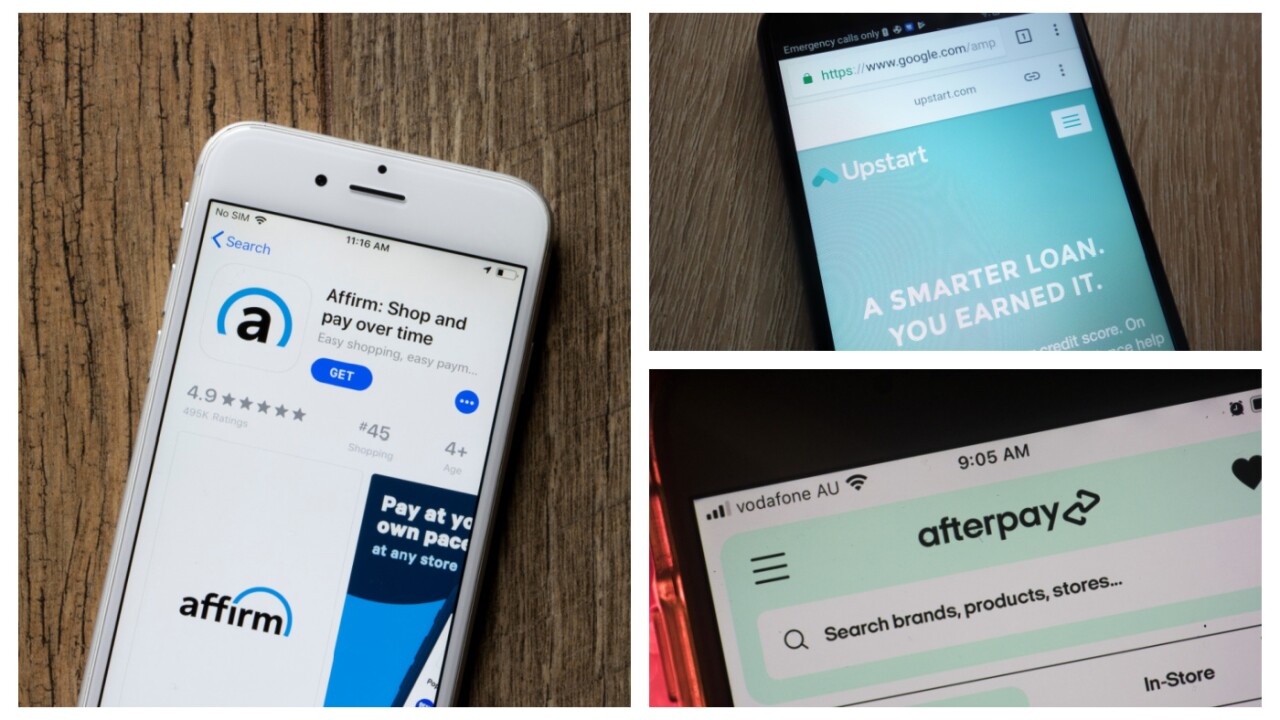The online consumer lender Upstart Holdings projected a steep decline in revenue Monday, but also expressed confidence that its artificial intelligence-based underwriting models are performing adequately.
The San Mateo, California, company, which uses AI to lend to people with lower credit scores, reported $228 million in revenues during the quarter. That figure was significantly below the roughly $300 million the lender had told investors to expect earlier this year.
Upstart, which said that fewer of its loans are being purchased by banks and other investors, expects its revenue to fall further to $170 million during the third quarter. Co-founder and CEO Dave Girouard called the projected decline "unacceptable."

"We're not happy with our results. We're not a company that likes to have a declining revenue from one quarter to the next," he said.
Weaker revenues are a "business problem that we need to address," Girouard told analysts, adding that the company is taking "steps to make the company stronger and better" by seeking more stable sources of funding.
The comments came as early worries
Upstart said Monday that its defaults have increased "significantly" but that an increase "was expected," given that fiscal stimulus programs earlier in the pandemic helped keep many Americans current on their loan payments.
Upstart — which was founded by Google alums in 2012 and
"Some of you have questioned whether Upstart veered too quickly into lending to riskier borrowers in 2021 in order to grow in our post-IPO phase," Girouard said. "But I believe we've done exactly what we set out to do and what we said we would do."
Upstart funds its loans both by partnering with more than 70 banks and credit unions, which hold loans on their balance sheets, and by making loans that eventually get sold to institutional investors.
But several banks and investors "reacted more quickly and abruptly than we anticipated" to ongoing worries about a looming recession, and they have "temporarily paused or reduced their originations," Girouard said. Since fewer banks and investors are buying Upstart's loans, the company is making fewer loans than it expected, leading to lower revenues from loan sales.
The funding constraints convinced Upstart that it needs to "upgrade and improve the funding side of our marketplace," Girouard told analysts. Right now, Upstart's loan purchase agreements are mostly decided on a month-by-month basis, but the company is exploring whether it can get longer-term commitments "from partners who will invest consistently through cycles."
The company is "evaluating a variety of opportunities to do just that, though we expect this will take some time to bring to fruition," Girouard said.
As part of its sales pitch, Upstart released data showing that investors who would have equal exposure across its borrowers over time would have expected a 9.8% gross annualized yield. That figure is above a target of about 8% and significantly better than the 2.9% annualized total return in the U.S. high-yield bond index, the company said.
"Our numbers show that institutional investors that have been with us for several years have done really well," Girouard said in an email to American Banker, adding that "long-term partnership agreements that recognize the long-term opportunity make sense."
One option that Upstart is ruling out: becoming a bank. Two fintechs that focus more on higher-income borrowers —
Upstart wants to "partner with banks, not compete with them," Girouard told American Banker.
"Becoming a bank would mean forgoing our mission to improve access to affordable credit, because banks aren't designed to change the way the credit system works," Girouard said, adding that regulators give banks top scores when they are not exposed to consumers with lower credit scores.
Upstart also says its AI models have "utility far beyond any single bank" by helping banks lend to a wider population than they usually do. "We believe that sharing our technology with banks and credit unions allows us to have a much larger impact," Girouard said.
Late-payment rates are rising at nonbanks that lend to people with lower credit scores. "We're probably entering a stretch where you're going to see a separation between those that are relatively good underwriters and those that are not," one analyst said.
But while Girouard told analysts it "doesn't make sense for Upstart to become a bank," he also said the company will start to hold more loans on its balance sheet as a "transitional bridge" to getting longer-term funding from investors.
The company is also pointing to other sources of growth, such as an auto lending business that hit $10 million in retail loan originations in the second quarter. At the end of June, Upstart launched a small-business loan program. That division has since made 40 loans totaling more than $1 million.
"That team is quickly ironing out operational issues with an eye toward rapidly expanding this product in the coming months and years," Girouard told analysts.
Upstart's stock price, which spiked to $390 in October, has fallen roughly 78% this year and is now at $32.27.






